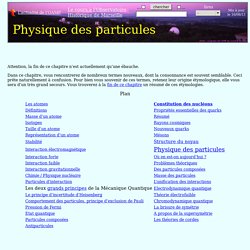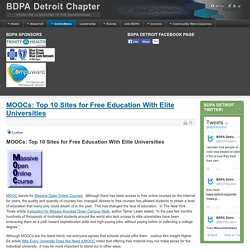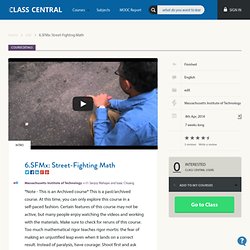

Discover Free Online Courses. Physique des particules. Attention, la fin de ce chapitre n’est actuellement qu’une ébauche.

Dans ce chapitre, vous rencontrerez de nombreux termes nouveaux, dont la consonnance est souvent semblable. Ceci prête naturellement à confusion. Pour bien vous souvenir de ces termes, retenez leur origine étymologique, elle vous sera d’un très grand secours. Vous trouverez à la fin de ce chapitre un résumé de ces étymologies. Plan Les atomes De quoi la matière est-elle constituée ? Cette simple question cache une difficulté extraordinaire, qui n’est pas totalement maîtrisée aujourd’hui. La matière est ce que nous connaissons et dont nous sommes faits. Définitions Les atomes sont les constituants de la matière.
Mais les atomes sont complexes, quelques belles expériences l’ont montré. Ces recherches ont donc montré que l’atome contenait des électrons, particules négatives. L’expérience de Rutherford a, outre la découvete des noyaux, permis de calculer leur volume. Les atomes sont neutres. Le noyau lui-même n’est pas simple. Courses. Apprenez à coder. Coursera. 6 Inspiring Websites That Teach You To Code. Top 10 Websites to Learn Coding (Interactively) Online. Gone are the days when programming languages could only be mastered programmers like Bill Gates, who later got to dominate the world by storm.

Now everyone holds the same potential, and the chance to learn and even master programming language easily. Today, we will show you 10 interactive websites that will help you do that. That’s right, forget about complicated setups and black, cold command prompts that make you want to quit before you start, and say hi to 10 educational websites with instant and interactive lessons that teach you programming languages like HTML, CSS, PHP, Ruby and even iOS. Pick up tips, screencasts and even best practices from industry professionals. Recommended Reading: Getting A College Degree Or Self-Learning? Kickstart the beginning of your new path into programming today! Codecademy. MOOCs: Top 10 Sites for Free Education With Elite Universities. MOOC stands for Massive Open Online Courses.

Although there has been access to free online courses on the Internet for years, the quality and quantity of courses has changed. Access to free courses has allowed students to obtain a level of education that many only could dream of in the past. This has changed the face of education. In The New York Times article Instruction for Masses Knocked Down Campus Walls, author Tamar Lewin stated, “in the past few months hundreds of thousands of motivated students around the world who lack access to elite universities have been embracing them as a path toward sophisticated skills and high-paying jobs, without paying tuition or collecting a college degree.”
Introduction to Household Water Treatment and Safe Storage. It is well known that water treatment at household level can lead to dramatic improvements in drinking water quality.

But does Household Water Treatment and Safe Storage (HWTS) also have a global relevance? What are the potential solution methods and how do they function? Is there a standard strategy for successful HWTS-implementation or can we identify key components which make programs more likely to succeed? In this course, you will learn about the public health impacts of unsafe drinking water and about different methods to treat water at household level.
The course takes a closer look at the roles of different stakeholders, such as governments, private sector, and NGOs. The MOOC “Introduction to Household Water Treatment and Safe Storage” will answer these questions with a series of concrete examples from Africa, Asia and Latin America. This MOOC is a collaboration of Sandec/Eawag and EPFL. The class will consist of lecture videos, which are between 5 and 15 minutes in length. 6.SFMx: Street-Fighting Math from edX. This course deals with an important topic that is neglected in the traditional mathematics curriculum: how to guess and estimate the answers to math problems.

You will learn, for example, how to estimate the size of the diaper market in the United States, how to estimate the surface temperature of planets in the solar Read More This course deals with an important topic that is neglected in the traditional mathematics curriculum: how to guess and estimate the answers to math problems. You will learn, for example, how to estimate the size of the diaper market in the United States, how to estimate the surface temperature of planets in the solar system, and how to estimate many definite integrals. This course requires a knowledge of calculus.
If you are familiar with Taylor series, you know enough to take this course. To find out if you want to take this course, download the textbook of the same name, which the instructor graciously makes available for free.